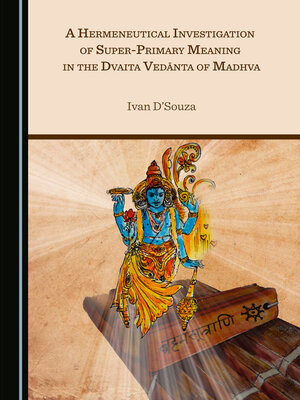A Hermeneutical Investigation of Super-Primary Meaning in the Dvaita Vedānta of Madhva
ebook
By Ivan D’Souza

Sign up to save your library
With an OverDrive account, you can save your favorite libraries for at-a-glance information about availability. Find out more about OverDrive accounts.
Find this title in Libby, the library reading app by OverDrive.



Search for a digital library with this title
Title found at these libraries:
| Library Name | Distance |
|---|---|
| Loading... |
This work is an in-depth study on the philosophy of Madhva, the Dvaita Vedānta. The Dvaita tradition, which chronologically comes after Advaita and Viśiṣṭādvaita, is one of the great Vedāntic schools. Madhva was a Hindu philosopher of the 12th century belonging to the Vaiṣṇava tradition, and emphatically established that Viṣṇu alone is the focal point of entire Vedic writings by employing an unparalleled hermeneutical technique known as "parama-mukhya-vṛtti" (the super-primary meaning) in all his writings. This study unearths this singular concept with the help of Madhva's commentaries and related Dvaita literature.The book explores Madhva's method of hermeneutics and exegetical patterns. It focuses on the first chapter of Brahmasūtras and Madhva's application of parama-mukhya-vṛtti. It further discusses the hermeneutical issues in some commentaries and independent works of Madhva. The work suggests steps to apply parama-mukhya-vṛtti to different religious texts, taking into account many Western continental thinkers who strike a chord with the thinking of Madhva. It employs an exegetico-interpretative method, and approaches Madhva's original writings, particularly the notion of parama-mukhya-vṛtti, through exegesis, showing its relevance through interpretation.This research will open up wide horizons by providing a new methodology to interpret the sacred texts of any religious traditions. It will also contribute to Madhva scholarship by stimulating scholarly exchanges, discussions and deliberations. Moreover, it will facilitate inter-religious dialogue and understanding, particularly in the multi-religious context of India.







